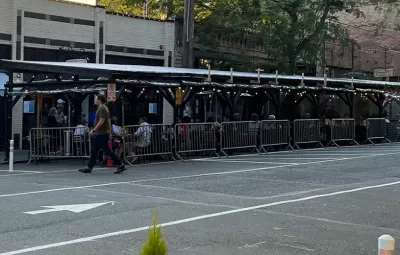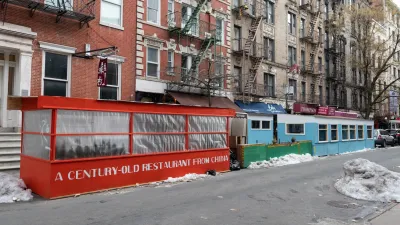Despite the popularity of Ballard Avenue’s outdoor dining pergolas, some district board members argue the patios don’t match the district’s historic character.

The popular outdoor dining patios created during the pandemic in Seattle’s Ballard Avenue Landmark District could be going away, if the district’s board has its way, reports Ray Dubicki in The Urbanist.
Despite widespread community support, some board members see the eateries as an eyesore that “defile the historic district.” One supportive board member challenged the idea that removing the patios in favor of street parking would improve the situation. “Why are we supporting cars instead of economic vitality,” Miriam Hinden asked.
Because of the historic nature of the district, board members want to require elements that would be cost-prohibitive for most business owners. Legally, because of their location on public right-of-way, the structures will always be deemed temporary by the city.
Dubicki points out that this highlights an inherent flaw in historic district guidelines: they don’t account for new concepts such as parklets or dining patios, leaving it up to board members to debate the appropriate number of pergolas on the street and what materials would fit in with the existing character of the neighborhood. Meanwhile, the street cafes “have done more than revitalize a stretch of shops and restaurants that were hard hit by pandemic shutdowns. They’ve become iconic in their own right.”
The original movement to preserve the district is based on economic revitalization, Dubicki notes. “Not a preservation movement. A revitalization movement.” The aesthetic qualities outlined in the historic district guidelines “are subjectively applied to new structures” anyway, Dubicki argues. “A lively Ballard Avenue is completely within the historic character of the district.”
FULL STORY: Ballard’s Historic District Board Looks to Blow the Roof Off Street Cafes

Maui's Vacation Rental Debate Turns Ugly
Verbal attacks, misinformation campaigns and fistfights plague a high-stakes debate to convert thousands of vacation rentals into long-term housing.

Planetizen Federal Action Tracker
A weekly monitor of how Trump’s orders and actions are impacting planners and planning in America.

San Francisco Suspends Traffic Calming Amidst Record Deaths
Citing “a challenging fiscal landscape,” the city will cease the program on the heels of 42 traffic deaths, including 24 pedestrians.

Defunct Pittsburgh Power Plant to Become Residential Tower
A decommissioned steam heat plant will be redeveloped into almost 100 affordable housing units.

Trump Prompts Restructuring of Transportation Research Board in “Unprecedented Overreach”
The TRB has eliminated more than half of its committees including those focused on climate, equity, and cities.

Amtrak Rolls Out New Orleans to Alabama “Mardi Gras” Train
The new service will operate morning and evening departures between Mobile and New Orleans.
Urban Design for Planners 1: Software Tools
This six-course series explores essential urban design concepts using open source software and equips planners with the tools they need to participate fully in the urban design process.
Planning for Universal Design
Learn the tools for implementing Universal Design in planning regulations.
Heyer Gruel & Associates PA
JM Goldson LLC
Custer County Colorado
City of Camden Redevelopment Agency
City of Astoria
Transportation Research & Education Center (TREC) at Portland State University
Jefferson Parish Government
Camden Redevelopment Agency
City of Claremont





























